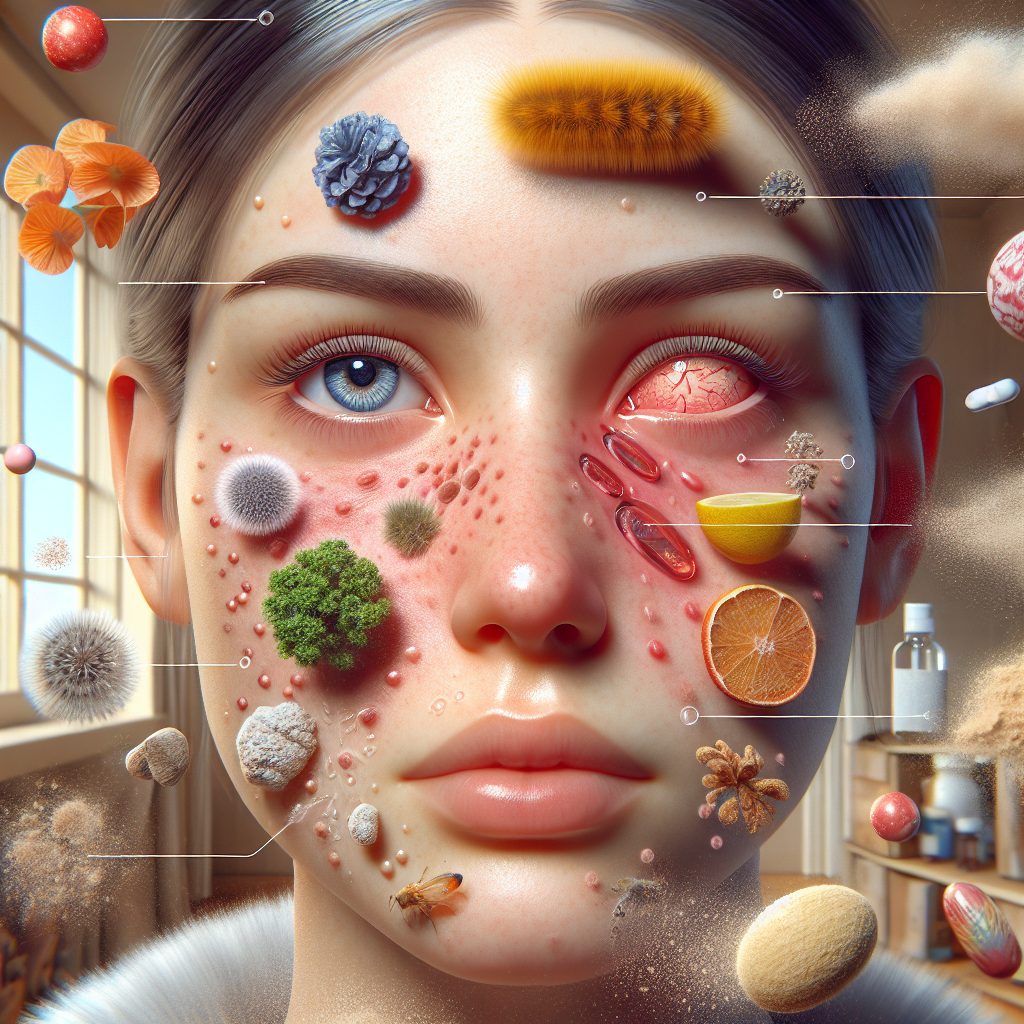
Allergens can be harmful to more than just our respiratory systems. For many individuals, allergens can also cause discomforting eye irritations. Allergy symptoms such as redness, itching, and tearing can cause a great deal of discomfort for your daily activities like working or concentrating. Identifying what triggers your allergies is the key to taking preventative action against them.
Common triggers of eye irritations are airborne allergens such as pollen, pet dander, dust, and mold. These allergens can enter our eyes by directly contacting the surface of the eye or by getting trapped in and around the mucous membranes of the eyes. Through these contact points, allergens can cause a person to suffer from symptoms such as watery eyes, redness, and intense itching. In some cases, long-term exposure can further increase the intensity of these symptoms. To reduce the chances of an allergic reaction, it is important to identify and reduce exposure to allergens as much as possible.
Key Takeaways
1. Allergic reactions such as eye irritation, itchy eyes and conjunctivitis can be caused by allergens such as dust mites, pollen, pet dander and smoke.
2. Performing a skin prick test can help determine the source of the allergy.
3. Allergy medications, such as antihistamines, can help relieve symptoms.
4. Wearing protective glasses and avoiding the allergen source can prevent future allergy episodes.
5. Environmental control measures such as using allergen-proof beds and avoiding air fresheners can help reduce allergen levels in the home.
Which Allergens Cause Eye Irritation?
As wide a variety of allergens might affect the eyes–from environmental agents like pet dander, outdoor and indoor mold, and pollen, to reactions to medication or medical treatments–and manifest as symptoms of eye irritation. Common indicators of eye allergy range from uncomfortable dryness and itching to redness, swelling, and secretions.
What Causes Allergic Eye Reactions?
The body’s immune responses, when it perceives that an allergen has invaded, can cause itching, inflammation, and the production of histamine and other chemicals that can further induce severe irritation in the eyes. Reactions tend to depend on a range of factors: sensitivity, the type of allergen, exposure time, and the immune system’s individual response.
What Symptoms of Allergic Eye Irritation Should I Look For?
For allergies, certain symptomatic indicators of eye irritation can be present, including dry eyes, itching, redness, and secretions. People with highly sensitivities can experience systemic responses that further impact other parts of the body. Allergic eye irritation may also be a sign of other eyes and vision issues, making it important to recognize these reactions and consult with a specialist if possible.
How to Alleviate Allergy-Related Eye Irritation?
Depending on the type of allergens inducing the eye irritation, some relief may require the use of cooled compresses, antihistamines, and decongestants–and, in more severe cases, prescription eye drops. Allergy-proofing an indoor environment with misters, dehumidifiers, and/or air purifiers can help those dealing with seasonal allergies. People may also be advised to avoid direct exposure to the allergen and onto contact lenses.
5 Tips to Prevent or Relieve Allergy-Related Eye Irritation
1. Wear protective eyewear such as sunglasses or safety glasses when exposed to the outdoors.
2. Check labels of household items for the presence of certain allergens.
3. Avoid contact with allergens if possible.
4. Rinse contact lenses with a prescribed, preservative-free saline solution.
5. Use over-the-counter and prescription medications as directed to alleviate symptoms.
What causes Allergens and Eye Irritation?
Allergens and Eye Irritation occurs when something in the environment — like pollen, pet dander, dust mites, or mold — triggers an immune response in your body. This triggers the release of antibodies, which then release chemicals like histamine, into the air to fight off the allergen. Histamine causes reactions that range from allergic asthma to allergic rhinitis to eye irritation.
How does eye irritation caused by allergens present itself?
Eye irritation caused by allergens usually presents itself as redness, itching or burning of the eyes, as well as a watery or heavy discharge from the eyes. Some people might also experience dizziness, fatigue, or even nausea.
What should be done if allergies cause eye irritation?
If allergies cause eye irritation, it is important to first determine what allergen is causing the irritation, such as pollen or pet dander. Once the allergen has been identified, the best way to manage the symptoms is to avoid exposure to the allergen. This means closing windows and doors when possible and wearing a face mask when outdoors or in dusty environments.
How can one prevent eye irritation from allergens?
The best way to prevent eye irritation from allergens is to minimize your exposure. Keeping windows and doors closed, using air filters in your home or office, avoiding pollen-producing plants, and taking allergy medications can help reduce the likelihood of exposure to allergens.
What are the most common types of allergies that cause eye irritation?
The most common types of allergies that cause eye irritation are hay fever, dust mite allergies, pet allergies, and mold allergies. Eye irritation caused by allergies is more likely to occur in people with conditions such as asthma or atopy.
What medications can be used to reduce the symptoms of eye irritation caused by allergies?
Antihistamines are medications often used to reduce the symptoms of eye irritation caused by allergies. Antihistamine eye drops can also be used, as well as steroid eye drops or topical steroid creams. In some cases, an allergy shot may also be recommended to reduce the allergen-specific response.
What are the most common home remedies used to relieve eye irritation caused by allergies?
Some of the most common home remedies for eye irritation caused by allergies include using a humidifier to ease dryness, washing the eyes gently with cool water, frequently changing pillowcases and face cloths, and taking breaks to rest the eyes. Additionally, it is important to get enough sleep and reduce stress levels.
What are the long-term effects of not treating eye irritation caused by allergies?
The long-term effects of not treating eye irritation caused by allergies can include decreased vision, painful inflammation, and a decreased ability to fight infections. If not treated properly, allergies can also cause permanent eye damage.
What are some steps that can be taken to reduce the severity of eye irritation caused by allergies?
Some steps that can be taken to reduce the severity of eye irritation caused by allergies include wearing protective eyewear, regularly washing your hands, using a saline nasal spray, and taking medications, such as antihistamines, prescribed by your doctor. Additionally, it is important to keep your home clean and dust-free.
How can one be tested for allergies that are causing eye irritation?
If allergies are suspected to be causing eye irritation, it is important to get allergy testing done to determine which allergens may be causing the reaction. Allergy testing typically involves skin prick testing or a blood test. Once the allergen has been identified, treatment can then be started.
Final Thoughts
Allergens and eye irritation can be a very uncomfortable and inconvenient condition to live with, but taking the proper precautions to reduce the risk of exposure and seeking advice from an eye care professional can help improve the symptoms. It is also important to get tested for allergies that may be causing the eye irritation in order to get the most effective treatment.
It is important to remember that allergens and eye irritation can be difficult to manage, but understanding the condition and taking action to reduce your exposure to allergens can help alleviate the symptoms. Seeking advice from an eye care professional can help you get the right treatment for your individual needs.



